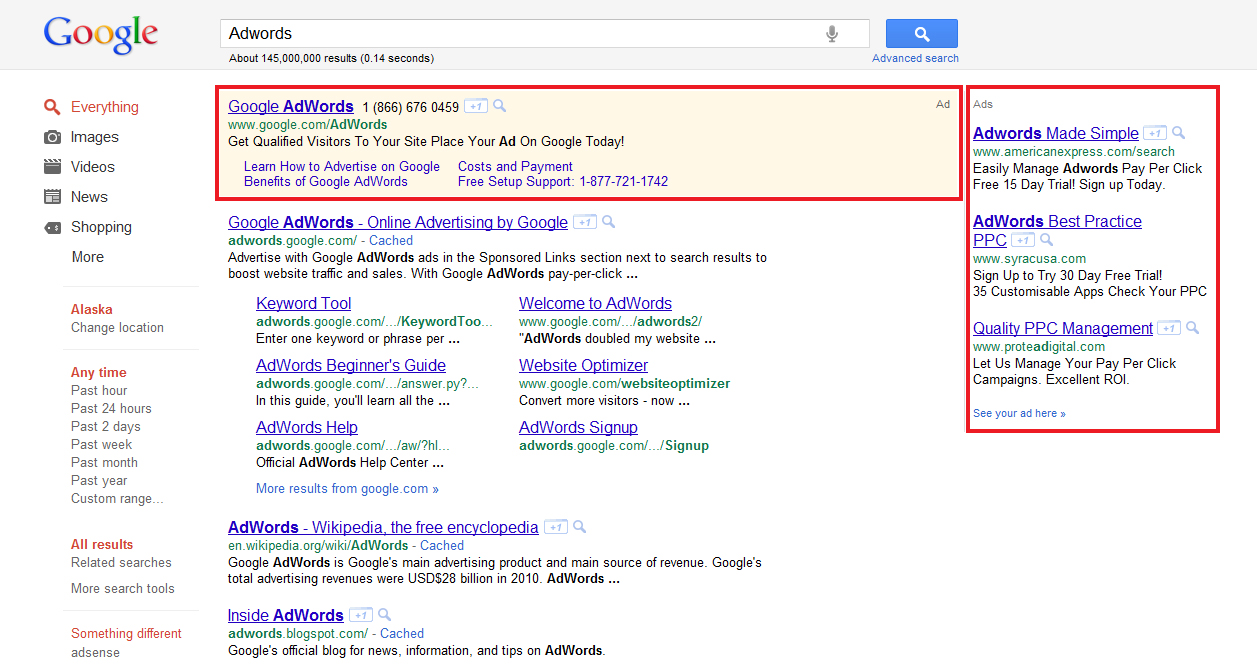What is PPC (Pay-per-click) Advertising?
PPC Advertising vs. ‘Organic’ SEO
PPC, or Pay-Per-Click (also CPC, Cost-Per-Click), in comparison to SEO represents paid listings in the SERPs (Search Engine Results Pages). These listing usually show up looking like this:

Usually distinguishable from ‘organic’ listings by shaded box and an “Ads” disclaimer, these listing are bid on by advertisers. The rank order is a function of the amount bid; whereas higher willingness-to-pay for a click-through warrants a higher listing on the page. An advertiser, however, only pays if the link is actually clicked on. CPC (Cost Per Click) campaigns differ largely from CPM (Cost Per Mil) campaigns in which an advertiser pays per thousand impressions (when a link or banner ad is displayed but is not necessarily clicked on). Due to declining CTR (Click Through Rates – the percentage of people clicking on a link against the amount of times that link is displayed), impression based campaigns usually prove to be higher cost per visitor & therefore higher cost per conversion.
Generally, the cost of a Google, Yahoo!, or Bing CPC campaign range from $.50 to $2.00/click. More competitive keywords however, like “buy Viagra online” as Matt Cutts jokes, can be bid on for as much as $20.00/click. I’ve seen some attorney related keywords like “personal injury” go for as high as $50/click.
Understandably, this sounds likes a great deal of money to be spent to have just one person visit a website—but for companies successfully optimizing PPC campaigns, especially for ‘large-ticket’ products (like furniture or cars) & residual-client business models (like lawn care, where you maintain a client indefinitely after acquiring them), these nominally high costs/conversion pay for themselves immediately, if not over a period of time.
Because of the flexibility & measurability of PPC campaigns, any company can return their investment if they first optimize a campaign, manage it correctly, and then design a website that is structured to both create & track conversions.
Search Engine Advertising
How do I optimize a PPC campaign?
- Landing Pages – The destination page of a given URL or SERP listing. Ensuring that a landing page is both attractive and relevant to the surfers query will optimize conversions and minimize bounce rate.
- GeoTargeting – SERP advertising provides like Google AdWords and Microsoft adCenter will allow advertisers to include and exclude internet surfers based on their location and IP address. Besides allowing retailers to advertise specifically to local consumers, advertisers can also run multiple advertising campaigns over varying locations to test for conversion.
- Broad, “Phrase”, & [Exact] Match Types – Control over what search queries trigger an ad will minimize waste. Perhaps your business only sells ‘Widget Type X’; a generic search for ‘Widgets’ may be too broad as a trigger word for your ads.
- Quality Score – As part of the ranking and bidding process within AdWords, the ‘Quality’ (in large part referring to the ‘relevance’) of a landing page in relation to the text ad and keyword that trigger the ad, play a part in both the amount you pay per click and your position in the SERPS.
- Negative Keywords – Take for example, again, that your business sells only ‘Widget Type X’; inserting negative keywords like ‘Type A’, ‘Type B’, etc. prevent search queries with those keywords from triggering your ads.
- Conversion Tracking – Tracking how would-be consumers moves through the buying cycle on your website allow advertisers to compare varying keywords, content, landing pages, and website designs to optimize conversions.
- A/B Testing – Text Ad can be tested for CTR. Keywords can be tested for CPC. Keywords should also be tested for cost/conversion. Landing pages can be tested for bounce rate. Internal pages can be tested for exit rate. Learn more about A/B testing and conversion optimization.
How do I optimize my website?
- Call to Action – Progression through the buying cycle should be facilitated by conspicuous prompts, phone numbers, driving directions, contact forms, etc.
- Reduce Bounce Rate – Conversions are a number game. The more people you can keep on your site, the more you will convert. Ensuring that landing pages are both attractive and relevant to a search query will minimize bounce rates and reduce unnecessary advertising costs.
- Mobile Site – – Studies show that roughly 64% of men and 55% of women will routinely browse product reviews, prices, and competitor prices of a product while in a retailers store in lieu of speaking with a sales person. In addition, a growing number of smart phone users are browsing retailer websites in the car before making a commitment to drive to the store. Nowadays, a website must display clearly and attractively a website on both desktop and mobile devices.
- Analytics – Analytics are the backbone of conversion optimization. Without being able to track user behavior on a website, it’s impossible to know what elements, designs, and sales procedures are working.
Next Steps
Feel free to contact me if your business needs additional support setting up and managing a Pay-per-click account. I am to provide custom proposals to set up and manage Google AdWords accounts for any size ad budget.